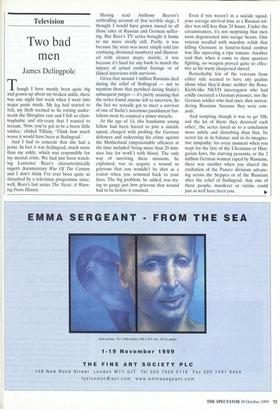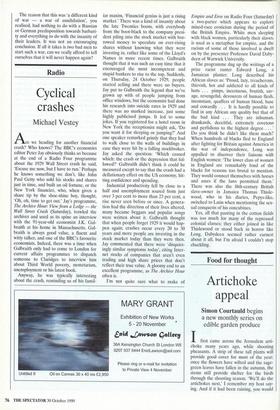Television
Two bad men
James Delingpole
Though I have mostly been quite big and grown-up about my broken ankle, there was one night last week when I went into major panic mode. My leg had started to itch, my flesh seemed to be rotting under- neath the fibreglass cast and I felt so claus- trophobic and stir-crazy that I wanted to scream. 'Now, you've got to be a brave little soldier,' chided Tiffany. 'Think how much worse it would have been at Stalingrad.'
And I had to concede that she had a point. In fact it was Stalingrad, much more than my ankle, which was responsible for my mental crisis. We had just been watch- ing Laurence Rees's characteristically superb documentary War Of The Century and I don't think I've ever been quite so disturbed by a television programme since, well, Rees's last series The Nazis: A Warn- ing From History.
Having read Anthony Beevor's enthralling account of that terrible siege, I thought I would have grown inured to all those tales of Russian and German suffer- ing. But Rees's TV series brought it home to me more vividly still. Partly, it was because the story was more simply told (no confusing divisional numbers) and illustrat- ed with clearer maps; mainly, it was because it's hard for any book to match the impact of actual combat footage or of filmed interviews with survivors.
Given that around 1 million Russians died during the relief of Stalingrad — not to mention those that perished during Stalin's subsequent purges — it's pretty amazing that the series found anyone left to interview. So the fact we actually got to meet a survivor of one of Stalin's notorious punishment bat- talions most be counted a minor miracle.
At the age of 14, this handsome young fellow had been forced to join a suicide squad, charged with probing the German defences and redeeming his crime against the Motherland (imprisonable offences at the time included 'being more than 20 min- utes late for work') with blood. The only way of surviving these missions, he explained, was to acquire a wound so grievous that you wouldn't be shot as a traitor when you returned back to your lines. The big problem, he added, was try- ing to gauge just how grievous that wound had to be before it counted. Even if you weren't in a suicide squad, your average survival time as a Russian sol- dier was still less than 24 hours. Under the circumstances, it's not surprising that men soon degenerated into savage beasts. One veteran recalled with macabre relish that killing Germans in hand-to-hand combat was like squeezing a ripe tomato. Another said that, when it came to close quarters fighting, no weapon proved quite so effec- tive as his trusty sharpened shovel.
Remarkably few of the veterans from either side seemed to have any qualms about what they'd done: neither the Rosa- Klebb-like NKVD interrogator who had coldly executed a German prisoner, nor the German soldier who had once shot surren- dering Russians 'because they were cow- ards'.
And tempting though it was to go 'Oh, sod the lot of them: they deserved each other', the series lured us to a conclusion more subtle and disturbing than that. Its secret lay in its balance and in its imagina- tive sympathy: for every moment when you wept for the fate of the Ukrainian or Hun- garian Jews, the starving peasants, or the 2 million German women raped by Russians, there was another when you shared the exultation of the Panzer divisions advanc- ing across the Steppes or of the Russians after the relief of Stalingrad. Any one of these people, murderer or victim, could just as well have been you. The reason that this was 'a different kind of war — a war of annihilation', you realised, had nothing to do with a Russian or German predisposition towards barbari- ty and everything to do with the insanity of their leaders. It was not an encouraging conclusion. If all it takes is two bad men to start such a war, can we really afford to tell ourselves that it will never happen again?



























































































 Previous page
Previous page